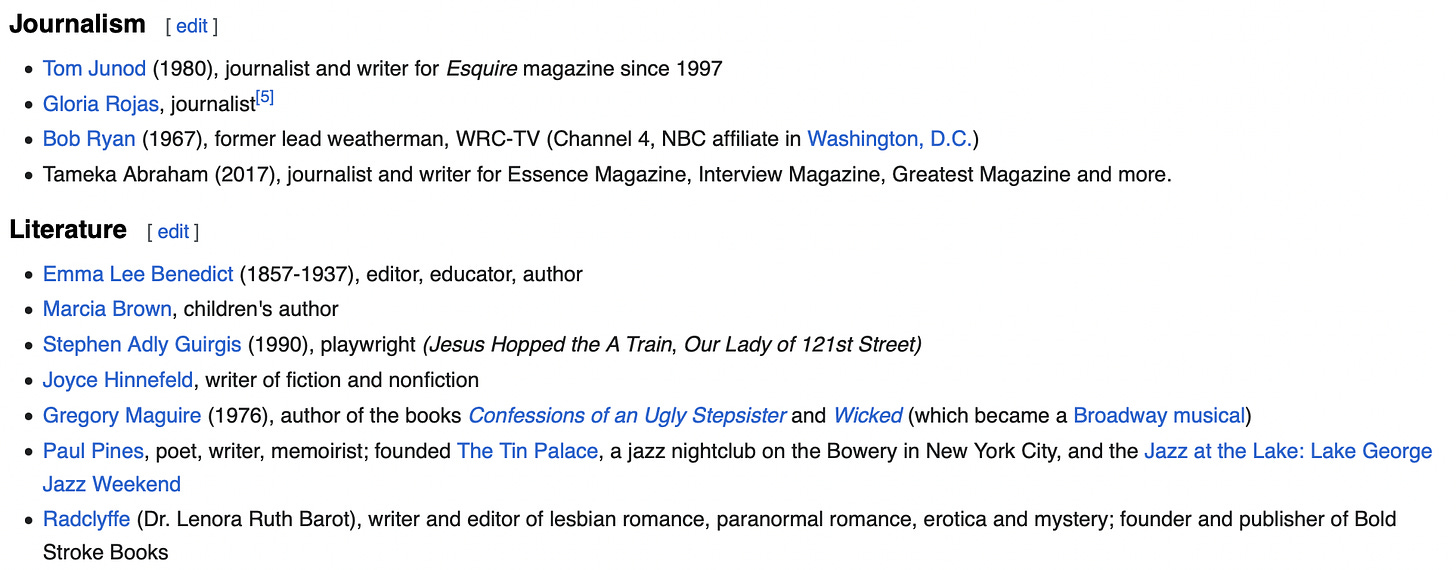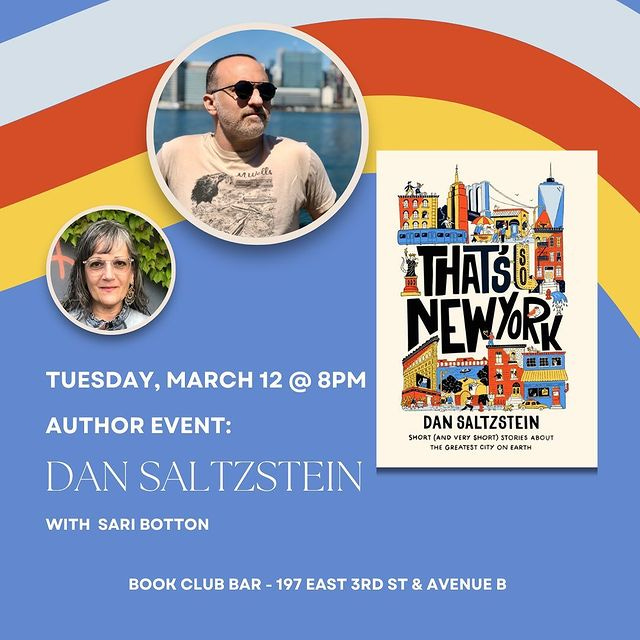At 58 I’m not supposed to still be ashamed of where I went to college. But I’ve carried that with me my entire career, and last week someone made a sneering comment on X/Twitter that validated my feelings.
In response to Joshua Benton’s February 28th Nieman Lab article, “Is The New York Times’ newsroom just a bunch of Ivy Leaguers? (Kinda, sorta.),” I saw someone tweet the screenshot below—a collection of schools that the fewest in the Times newsroom attended—and remark in their tweet how surprised they were that anyone at the Times had gone to any SUNY school.
Joke’s on me, proud/ashamed member of SUNY Albany’s Class of ‘87. I guess it’s time to not only avoid posting on X/Twitter, but reading it, too. But that post was hardly the only instance of this kind of shaming. I bump into it out in the world now and then, too.
For instance, recently I had an exchange with someone much better bred—and schooled—that also left me wanting to crawl under a rock. This person asked me, blithely (maybe in an Underminer-y kind of way?), which famous journalists and authors graduated from SUNY Albany. I said, “Absolutely no one.”
No, really—here’s a list of the writers who are “notable alumni” from Wikipedia:
Okay, Tom Junod is someone, as is Gregory Maguire, author of Wicked. But they’re the only two people on these two lists that I’ve ever heard of.
So often, even this close to 60, I lament how, under different circumstances, I might have done better. When I was a high school senior, my parents were too strapped, and preoccupied with fucked up divorce and blended-family drama, to help me figure out where to apply, or how to get scholarships and loans. Life in my house was chaotic and terrifying. I was too preoccupied with surviving, physically and emotionally, to do as well at school as I had when I was younger, before things got crazy. Once an A student at the top of my class, I became an anxious, depressed underachiever, who received mostly B and B+ grades.
When it came time to consider schools, all I knew was that I now had average marks, and that my parents told me I had to pay for college—and figure out where to go—all on my own. The SUNY schools were what I could afford, if I also took jobs, so they were the only ones I applied to. That decision—made when I was 17, clueless, and traumatized—still dogs me, in my mind, and in the real world, where I’ve always had to compete with those who had fancier degrees, the useful connections and access that come with them, and a more straightforward path to the best opportunities.
***
I don’t only have shame, though. It’s weirdly bound up with pride. I’m proud of how hard I’ve strived, and how much I’ve achieved, given the odds against me.
I guess I’m going to own this: I’m a striver. There, I said it, for better and worse.
Striving has very different connotations depending on your perch in the pecking order. The people below you see it as admirable and cheer you on, while those above you see it as uncouth, and sneer. The latter are so repulsed by your ambition and thirst—and your gall in presuming you deserve to move even one inch closer to where they are—that they act like you don’t exist, or worse, go to work gate-keeping you. They themselves embody an attitude of “I don’t chase; I attract.” But they don’t realize not everybody is poised to simply sit back and let opportunities arrive at their doorstep.
I’m reminded of what a stunning blow it was when uber-privileged Shiv Roy leveled the word “striving” at her baldly ambitious fiancé, Tom Wambsgans, in the “Tailgate Party” episode of Succession. I appreciate what Elizabeth Spiers had to say about that in an opinion piece in the New York Times, “On Succession, Striving is the Worst Insult of All”:
In theory, America loves strivers — people who start with very little and through hard work and determination will themselves into success…The more common reaction to strivers—as with the party crasher carrying the ludicrously capacious bag—is that they’re told they don’t belong in the room.
My pride notwithstanding, I’m always anxious about being caught striving. Needing. Wanting.
A couple of years ago I witnessed someone who’s in something of a gatekeeping position gleefully admitting they were withholding an opportunity from a writer “because she wants it too badly.” The gatekeeper said this bearing a sort of devious grin. I was disgusted, but also chastened.
It made an impression on me that came to mind earlier this week, when I admitted—to a couple of people who might be in a position to help me—that there’s something I very much want, something that seems reasonable for me to attain, something that would give my work greater reach, but which currently is beyond my grasp.
I’ve been anxious and uncomfortable ever since I spoke to them. I’ve ruminated, again and again, What was I doing letting myself be seen wanting an opportunity that hasn’t just magically come to me? Who the hell do I think I am to deserve it?
I’ve been trying to talk myself out of my shame ever since.
***
My anxiety about all this recently got ratcheted up a few notches after I discovered I’m missing most of my clips from print publications from the late ‘80s through the early aughts, before many of them began publishing online.
This happened after I read about a few outlets firing their entire staffs, then taking down the archives—along with contributors’ digital clips. It inspired me to revisit an idea I’ve put off forever, namely the drudgery of digitizing my old print tear sheets. But now I can’t find most of them.
I have some on hand. There’s one binder in my office with a sampling of pieces from the New York Times City Section, Rolling Stone, Paper, Interview, Billboard, the Daily News, Time Out NY, Harper’s Bazaar, Marie Claire, WWD, W, and a few others. But that’s just a fraction of the whole collection. I thought I knew where the blue Rubbermaid bin and the brown accordion folder with the rest of my work were, but apparently not; I’ve torn apart the house, the basement, and the garage. They’re nowhere.
We’re not talking Pulitzer material. It’s largely a mix of early personal essays (some pretty half-baked), service journalism, and arts coverage, including short and long profiles. There are my very first bylines, too, travel pieces (total fluff) that I wrote while interning on the I ❤️ NY campaign in 1986, which were picked up by newspapers around the state.
It’s not like I need those clips from the 80s and 90s for any functional reason. I’m not going to put them in a portfolio and shlep them with me on an interview at a newspaper or magazine like it’s 1994, not 2024, and there are actual journalism jobs to be had. But, who knows, maybe they’d be good fodder for new pieces—new pieces about the old pieces—something my friend Laurie Stone often does, to great effect.
In any case, that work is a part of me, and now it’s missing, and I’m freaking out. I worked so hard to land many of those assignments, often on the side, while working full-time jobs at trade publications, or as a ghostwriter. It’s not only evidence of the work I’ve done—and proof I’m capable of it—but a record of my striving as something of a perpetual outsider, a part of my identity I guess I’m kind of attached to.
***
Lindsay Zoladz’s recent New York Times profile of Kim Gordon reminded me that one of my missing clips is an interview I did with Gordon 30 years ago for WWD/W, about her clothing line, X-Girl. All I have to show for it is this lousy, badly lit photo I took.

At the time, I was enrolled in a black-and-white photography class at ICP. Even though there was always a Fairchild photographer with me on my WWD/W assignments, I took pictures of some of my subjects with my analog Pentax SLR, too.
Until recently, searches for my WWD/W articles didn’t return results, but they must have now digitized bits of their archive from the 80s and 90s, because suddenly I can find short excerpts from some of the pieces. I found an excerpt of the Kim Gordon piece, and was struck by a quote in it:
“The spirit of X-Girl is not really just about age,” Gordon says. “It’s sort of an inexpensive, sort of tomboyish do-it-yourself approach to fashion. I’m pretty old, and I wear it. Even when you’re an adult, you never feel like one.”
Seems like a response to The Oldster Magazine Questionnaire. If Gordon is 70 now, she must have been 40 when I interviewed her, and she said this. I’m realizing I should probably find a way to get that Q&A into her hands…
In other news…







Idk, I went to a fancy school that has produced a number of famous authors, musicians, artists, etc. but as a kid who applied to college from foster care with good grades and test scores but no one to guide me (I vividly recall sitting on the floor of the Barnes & Noble reading US News and World Report’s College Guide cover to cover), I had no idea how much damage I’d do to myself striving to keep up with my fancy liberal arts college classmates, Nepo babies many of them or just simply people who had fallback plans and parents to guide them. I don’t regret my college experience, but might have been better off at SUNY Binghamton (my safety school), where I could have gotten some real-world experience and a bit of vocational guidance beyond: dream big and follow your dreams.
I graduated from the University of Nebraska - Lincoln ("Where was that?" and "Why?!" were the two questions almost guaranteed would come my way every single time I disclosed that fact), and guess who were the top "notable alumni" on Wiki? Warren Buffett, Johnny Carson, Evan Williams, ... and the list goes on - Willa Cather, Mary Pipher, and, Roxane Gay.
Case closed :).